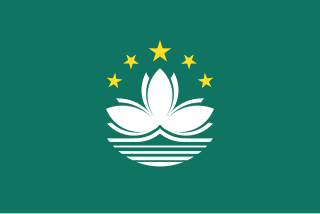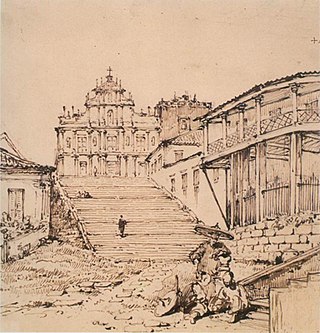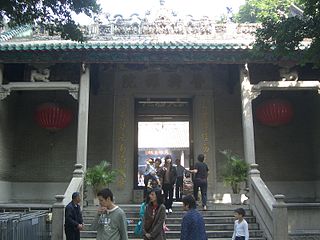
Macau or Macao is a special administrative region of the People's Republic of China. With a population of about 710,000 people and a land area of 32.9 km2 (12.7 sq mi), it is the most densely populated region in the world.

Macau is a special administrative region (SAR) of the People's Republic of China. It was leased to Portugal in 1557 as a trading post in exchange for a symbolic annual rent of 500 tael. Despite remaining under Chinese sovereignty and authority, the Portuguese came to consider and administer Macau as a de facto colony. Following the signing of the Treaty of Nanking between China and Britain in 1842, and the signing of treaties between China and foreign powers during the 1860s, establishing the benefit of "the most favoured nation" for them, the Portuguese attempted to conclude a similar treaty in 1862, but the Chinese refused, owing to a misunderstanding over the sovereignty of Macau. In 1887 the Portuguese finally managed to secure an agreement from China that Macau was Portuguese territory. In 1999 it was handed over to China. Macau was the last extant European territory in continental Asia.
The Macanese people are a multiracial East Asian ethnic group that originated in Macau in the 16th century, consisting of people of predominantly mixed Cantonese and Portuguese as well as Malay, Japanese, English, Dutch, Sinhalese, and Indian ancestry.
Gweilo or gwailou is a common Cantonese slang term for Westerners. In the absence of modifiers, it refers to white people and has a history of racially deprecatory and pejorative use. Cantonese speakers frequently use gwailou to refer to Westerners in general use, in a non-derogatory context, although whether this type of usage is offensive is disputed by both Cantonese and Westerners.
Cantonese is the traditional prestige variety of Yue Chinese, a Sinitic language belonging to the Sino-Tibetan language family. It originated in the city of Guangzhou and its surrounding Pearl River Delta, and is currently spoken by over 82.4 million native speakers.

The Treaty of Wanghia was the first of the unequal treaties imposed by the United States on the Qing dynasty. By the terms of the diplomatic agreement, the United States received the same privileges with China that Great Britain had achieved under the Treaty of Nanking in 1842. The United States received additional privileges as well, including the right to cabotage on preferential terms and the expansion of extraterritoriality. Imperial China's Qing dynasty signed the treaty with the United States on July 3, 1844, in the Kun Iam Temple. The treaty was subsequently passed by the US Congress and ratified by President John Tyler on January 17, 1845. The Treaty of Wanghia was formally in effect until the signing of the 1943 Sino-American Treaty for the Relinquishment of Extraterritorial Rights in China.
Austin Francis Harrison Coates was a British civil servant and writer. Coates was a RAF Intelligence officer in World War II, and his service in Burma, India, Singapore and Malaysia was his first time in the Far East. In 1949, he joined the Colonial Service and occupied civil positions in Hong Kong and Malaysia before retiring in 1962 to become a full-time writer. Coates wrote prolifically on Oriental studies and travel, especially on Hong Kong and Macau. His best-known book is Myself a Mandarin (1968), a memoir about his tenure in Hong Kong. In the Philippines, Coates is best known for Rizal: Philippine Nationalist and Martyr (1968), which is still considered one of the best biographies of the de facto national hero.

The handover of Macau from the Portuguese Republic to the People's Republic of China was at midnight on 20 December 1999. This event ended 442 years of Portuguese rule in the former settlement, which began in 1557.
Lucien André Bianco is a French historian and sinologist specializing in the history of the Chinese peasantry in the twentieth century. He is the author of a reference book on the origins of the Chinese Communist Revolution and has co-edited the book China in the twentieth century. His Peasants without the Party was awarded the Association for Asian Studies Joseph Levenson Book Prize in 2003.

Stanley Internment Camp was a civilian internment camp in Hong Kong during the Second World War. Located in Stanley, on the southern end of Hong Kong Island, it was used by the Japanese imperial forces to hold non-Chinese enemy nationals after their victory in the Battle of Hong Kong in December 1941. About 2,800 men, women, and children were held at the non-segregated camp for 44 months from early January 1942 to August 1945 when Japanese forces surrendered. The camp area consisted of St Stephen's College and the grounds of Stanley Prison, excluding the prison itself.

East Asia is a geographical and cultural region of Asia including the countries of China, Japan, Mongolia, North Korea, South Korea, and Taiwan. Additionally, Hong Kong and Macau are the two special administrative regions of China. The economies of China, Japan, South Korea, and Taiwan are among the world's largest and most prosperous. East Asia borders North Asia to the north, Southeast Asia to the south, South Asia to the southwest, and Central Asia to the west. To its east is the Pacific Ocean.
A de facto embassy is an office or organisation that serves de facto as an embassy in the absence of normal or official diplomatic relations among countries, usually to represent nations which lack full diplomatic recognition, regions or dependencies of countries, or territories over which sovereignty is disputed. In some cases, diplomatic immunity and extraterritoriality may be granted.

Jean Berlie is a French socio-anthropologist specialising in Asia and China.

Gordon Redding, MA (Cambridge, PhD, D.Econ h.c., was a British professor, academic, author, editor, and consultant. He was today a specialist on China and the regional ethnic Chinese, and also works on the comparison of different systems of capitalism, and on the role of education in societal development. His core interest was in the role of culture in the shaping of societal progress. He has published 15 books and 150 articles related to these subjects. He held a number of professorships, and is currently working as a Senior Fellow of the HEAD Foundation, based in Singapore. This is a non-profit foundation which he was invited by regional philanthropists to establish in 2010, and initially directed to 2014. He also spent 24 years at the University of Hong Kong, where he founded and directed the HKU Business School. For seven years from 1997 he was Director of the Euro-Asia Centre at INSEAD in France. He was also for ten years a Director of the Wharton International Forum, working globally in executive education. Now living in London he held - from 2013 to 2015 - a Visiting Professorial Fellowship at the Institute of Education, UCL.

Jardine Matheson Holdings Limited is a Hong Kong–based, Bermuda-domiciled British multinational conglomerate. It has a primary listing on the London Stock Exchange and secondary listings on the Singapore Exchange and Bermuda Stock Exchange. The majority of its business interests are in Asia, and its subsidiaries include Jardine Pacific, Jardine Motors, Hongkong Land, Jardine Strategic Holdings, DFI Retail Group, Mandarin Oriental Hotel Group, Jardine Cycle & Carriage and Astra International. It set up the Jardine Scholarship in 1982 and Mindset, a mental health-focused charity, in 2002.
Luso-Asians are Eurasian people whose ethnicity is partially or wholly Portuguese and ancestrally are based in or hail primarily from Portugal, South Asia, Southeast Asia, and East Asia. They historically came under the cultural and multi-ethnic sway of the Portuguese Empire in the East and retain certain aspects of the Portuguese language, Roman Catholic faith, and Latin cultural practices, including internal and external architecture, art, and cuisine that reflect this contact. The term Luso comes from the Roman empire's province of Lusitania, which roughly corresponds to modern Portugal.

The South China Sea raid was an operation conducted by the United States Third Fleet between 10 and 20 January 1945 during the Pacific War of World War II. The raid was undertaken to support the liberation of Luzon in the Philippines, and targeted Japanese warships, supply convoys and aircraft in the region.

Xu Xu, aka Hsu Yu (徐訏), was the pen name of Xu Boxu, an important figure in modern Chinese literature. Born in Cixi in the coastal province of Zhejiang, Xu Xu attended Peking University between 1927 and 1932 where he studied philosophy and psychology. In 1932, he moved to Shanghai where he became an associate of Lin Yutang, a liberal and polyglot intellectual who ran a number of successful literary journals. In 1950, Xu Xu left the newly founded People's Republic of China for Hong Kong where he stayed for the rest of his life. Best known as the author of the modern gothic tale Ghost Love or his wartime spy-epic The Rustling Wind, Xu Xu was also a prolific poet, playwright, essayist, literary critic, journal editor, and professor of literature. Many of his popular novels were turned into movies or TV series in post-war Hong Kong and Taiwan. As a writer, editor, and educator, Xu Xu has had a formative impact on a younger generation of post-war writers emerging in Hong Kong and Taiwan. In much of his fiction, and especially in his later works from Hong Kong, Xu Xu explored reality-defying experiences and displayed neo-romantic tendencies, such as aesthetic escapism and mysticism, which place him in the proximity of other modern artists associated with the global revival of romanticism in the 20th-century. He was nominated for the 1973 Nobel Prize in Literature.

The Lone Flag: Memoir of the British Consul in Macao during World War II, a 2014 nonfiction English language book published by Hong Kong University Press, is a memoir by John Pownall Reeves, who from 1941 to 1946 served as the British consul residing in Macau. He assisted British citizens and others during World War II, when Hong Kong, then a British territory, was invaded by Japan. At the time Macau was controlled by Portugal, which had not chosen a side in the war; Macau was not invaded by any party. Colin Day and Richard Garrett edited the published work, and the volume also includes an essay written by David Calthorpe about Reeves. It is a part of the Royal Asiatic Society Hong Kong Studies Series.
John Pownall Reeves (1909–1978) was a British diplomat. He was a member of the British China Consul Service posted as British Consul to the Portuguese colony of Macau in southern China during World War II, from 1941 to 1946.












